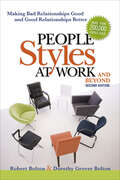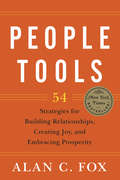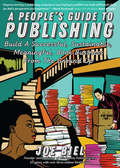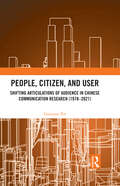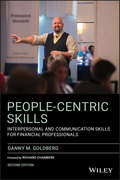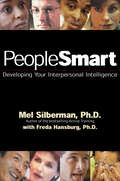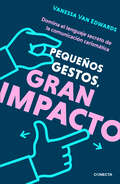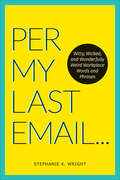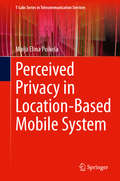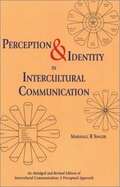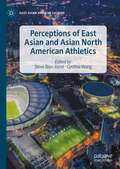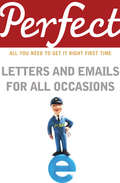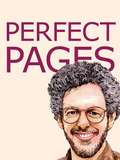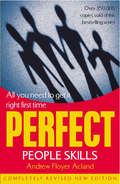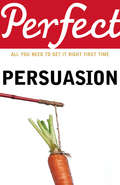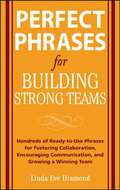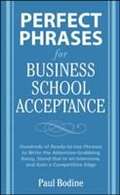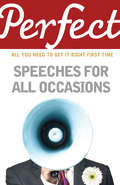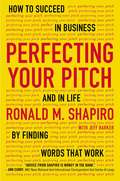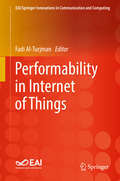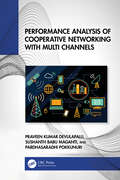- Table View
- List View
People Styles at Work and Beyond: Making Bad Relationships Good and Good Relationships Better
by Robert Bolton Dorothy Grover BoltonAs cofounders of the leadership coaching and training firm Ridge Associates, authors Robert Bolton and Dorothy Grover teach that good interpersonal communication is essential to getting things done.In this comprehensive and practical guide, they offer a proven method for understanding the key behavioral styles of those around you (including your own) and explain how you can leverage the strengths and weaknesses of each to relate to others more winsomely.People Styles at Work . . . and Beyond teaches you how to:recognize how they come across to other coworkers;read others' body language and behavior to identify the best ways to work with them;make small adjustments that will dramatically increase the quality and productivity of their interactions;find common ground with different people while retaining their individuality;relate less defensively and more effectively no matter how others act.At work, at home, and even while you&’re out running errands, your ability to relate to others affects how well you get things done. This book provides a self-assessment to determine which style you are and then uses that information to gauge how you should interact with others.Now including all new material on personal relationships, parenting, and more, People Styles at Work . . . and Beyond is the ultimate how-to guide that can help you avoid conflicts and enhance important relationships.
People Tools
by Alan C. FoxGetting along well with others is the real secret to success and happiness. In tens of thousands of classrooms we teach reading, writing, and arithmetic and yet we leave solutions to the universal problems of human relationships to be discovered, if at all, by trial and error. The trial is painful and the error is costly. People Tools: 54 Strategies for Building Relationships, Creating Joy, and Embracing Prosperity, provides time-proven techniques that you can use to build a better, happier, more successful life. It is the perfect resource for busy people looking for fast and effective solutions to the challenges we face every day. "People Tools" are practical and easy to understand. From developing self-confidence, to improving communication skills, to finding constructive ways to resolve conflict, each "People Tool" addresses a specific issue and provides a simple, straightforward strategy that you can adopt to bring about a positive result. Open the book to any page and you will find a useful solution. Each tool is illustrated with insightful stories and amusing anecdotes that are relevant and relatable. The stories will reel you in but the advice will change your life. "This book will do a lot for the world. " - Bill CosbyAlthough you may recognize the more intuitive techniques in People Tools, this sourcebook provides explanations and helpful examples from a vast collection of different tools designed to help you further expand your own existing repertoire of skills. Some of the useful "People Tools" in the book include:1. The Belt Buckle. When words are different than action (The Belt Buckle), trust the Belt Buckle, not the words. 2. Buy a Ticket. To make something good happen in your life you have to participate. 3. Catching a Feather. An alternative to the endless chase, this Tool reveals how to attract people you want to be closer to. 4. Patterns Persist. Prior actions are predictive of future behaviors. 5. Catch Them Being Good. Rewards are more effective than punishments. People Tools is organized into 54 chapters. Each chapter offers a life-changing insight. "Use them to live well, and your life will grow better for it. " -Jack Kornfield, psychologist, author, and founder of Spirit Rock Meditation Center
People's Guide to Publishing: Building a Successful, Sustainable, Meaningful Book Business From the Ground Up
by Joe BielSo, you want to publish books.Drawing on 23 years of experience operating an independent publishing company, Joe Biel has written the most accessible and comprehensive guide to running a successful publishing business. You'll learn all the skills of the trade, including how to:Develop your individual books to connect with readers on a practical and emotional levelChoose between offset printed, digitally printed, and eBook formats and work effectively with printersBuild an authentic niche so you can reach your audience and sell books directlyUnderstand if and when you're ready to work with a distributor or large online retailerCreate a budget and predict the cost and income of each book so your company stays in the blackDecide what work you need to do yourself and what can be done by othersPlan for sustainable growthFeaturing interviews with other upstart independent publishers and funny anecdotes from publishing's long history as well as detailed charts and visuals, this book is intended both beginners looking for a realistic overview of the publishing or self-publishing process and for experienced publishers seeking a deeper understanding of accounting principles, ways to bring their books to new audiences, and how to advance their mission in a changing industry. All readers will come away with the confidence to move forward wisely and a strong sense of why publishing matters today more than ever.
People, Citizen, and User: Shifting Articulations of Audience in Chinese Communication Research (1978 – 2021)
by Guiquan XuThe book examines the changing discourses of Chinese audience research in the past four decades, aiming to shed light on the complicated relationships among China’s media, audiences, and society. With the new sociology of knowledge, it adopts Laclau and Mouffe’s discourse theory as a meta-theoretical framework and interprets the concept of audience as a floating signifier. Based on the corpus of Chinese academic journal papers, the author divides the scope of analysis into four phases. In each period, Chinese audience research was related closely to the changing societal and academic contexts and hegemonic struggle as a whole. In addition, it discusses the relation between ‘western’ audience theories and Chinese audience research, as well as the contingency and rigidity of discourses in Chinese audience research. The book contributes to the understanding of Chinese communication research in the changing societal context and will be valuable for scholars of media and communication studies or China studies.
People-Centric Skills: Interpersonal and Communication Skills for Financial Professionals (Wiley Corporate F&a Ser.)
by Danny M. GoldbergUse your interpersonal and communication skills as a financial professional to work successfully with clients Embark on a journey to further develop your career when you read People-Centric Skills: Interpersonal and Communication Skills for Financial Professionals, 2nd Edition. Business leaders consider employee communication skills and critical thinking abilities as essential elements for success. In their work, all professionals must communicate clearly and rely on their interpersonal skills to be successful. This second edition of People-Centric Skills shares the fictional story of Dalton Zimmer, executive coach and public speaker. Dalton, all the while juggling his business, kids and social life, provides coaching and communication strategies for handling challenging situations faced by his clients. This insightful narrative will help you expand communication and soft skills as a CPA, auditor, financial planner or other financial professional. As Generation Z is entering the work force, the communication gap between Z and Boomers or Generation X is widening significantly. New to the second edition, you’ll find a discussion of communication between generations and how to bridge them as a financial professional. You can be a more people-centric leader as you engage with a wide range of clients and associates. This book can be a first step to improving interpersonal and communication skills as you continue to develop in your career.
PeopleSmart: Developing Your Interpersonal Intelligence
by Mel Silberman Freda HansburgWE ARE ALL in the people business because we deal with other people all the time. But do you sometimes reach out to others only to find your efforts misunderstood or rejected? Do you wish your relationships with people close to you were more harmonious and fulfilling? PeopleSmart is a practical guide for anyone who asks these questions, which means most of us at some time or other. It reveals a powerful plan for making your relationships more productive and rewarding-whether they are with a supervisor and coworkers or a spouse, relatives, and friends-by developing your interpersonal intelligence.
Pequeños gestos, gran impacto
by Vanessa Van EdwardsUsa los gestos a tu favor y conviértete en un líder carismático y exitoso. Si alguna vez te han interrumpido en una junta, te pasaron de largo cuando había oportunidades laborales disponibles o ignoraron tus ideas, puede que tus gestos sean el problema... y la solución. Son esas pequeñas señales que enviamos a los demás 24 / 7 por medio de nuestro lenguaje corporal, las expresiones faciales, las palabras que escogemos y las inflexiones de voz. Tienen un impacto enorme en cómo nosotros y nuestras ideas se vinculan, e incluso pueden impulsar o restarle potencia a un mensaje. En esta accesible y entretenida guía sobre el lenguaje secreto de los gestos, Vanessa Van Edwards enseña a usar el poder de los gestos vocales, corporales, verbales y otras señales para: • Proyectar poder, simpatía, confianza, liderazgo y empatía en cada interacción. • Lograr que te perciban como una persona carismática. • Ser escuchado y conseguir tus objetivos. • Usar las palabras correctas en tu CV, marca personal y hasta en los correos para ganar más clientes, contratos y proyectos. • Generar entusiasmo en tu interlocutor al interactuar contigo. • Crear conexiones relevantes y un impacto duradero. Un libro indispensable para emprendedores Un libro indispensable para emprendedores, líderes de equipos, jóvenes profesionistas y cualquier persona que quiera aumentar su influencia.
Per My Last Email: Witty, Wicked, and Wonderfully Weird Workplace Words and Phrases
by Stephanie K. WrightOffices are a breeding ground for odd expressions and hackneyed platitudes. Why are we peeling onions and putting irons in the fire? Why is our plate always full? And most importantly, how is it even possible to give 110%? Per My Last Email provides you with fresh new words to sprinkle throughout your workday and lift you out of your office-speak rut while making you laugh at the same time. With unexpected and entertaining phrases to boost the productivity of your meetings, revitalize your email game, and even the occasional office-appropriate swear, this book is a fun and informative send-up of stale corporate lingo that will help you freshen up your own workplace communication.
Perceived Privacy in Location-Based Mobile System (T-Labs Series in Telecommunication Services)
by Maija Elina PoikelaThis work aims at understanding behavior around location information, including why users share such information, why they protect the data, and what kind of other factors influence the decision to behave in a certain way. This book explores privacy in the context of location data, and answers questions such as what are the privacy related behaviors in this context, and what are the factors influencing such behaviors. The book gives an overview to what privacy means for users in terms of understandings, attitudes and valuations. This book discusses reasons for why research around this topic is challenging, and presents various methods for diving into the topic through empirical studies. The work is relevant for professionals, researchers, and users of technology.
Perception and Identity in Intercultural Communication (2nd edition)
by Marshall R. SingerBy reading this book the reader will not only become better at communicating across cultural barriers but will also enjoy it more.
Perceptions of East Asian and Asian North American Athletics (East Asian Popular Culture)
by Cynthia Wang Steve Bien-AiméThis book highlights inconsistencies within the field of sports scholarship and provides an opportunity to open up and extend conversations about the intersection of sports media and race — particularly surrounding athletes of East Asian descent. Despite the growing influence of East Asian and Asian American/Canadian athletes, they are still underrepresented in Western media and in scholarship. This anthology adds much-needed literature to sports, popular culture, East Asian, and Asian American studies. The prominence of sports in global popular culture makes the intersections explored in this collection a crucial addition to existing conversations about both sports and East Asian/Asian American/Canadian studies.
Perfect Confidence
by Jan FergusonPerfect Confidence is the ideal companion for anyone who wants to boost their self-esteem. Covering everything from communicating clearly to handling conflict, it explains exactly why confidence matters and equips you with the skills you need to become more assertive. Whether you need to get ahead in the workplace or learn how to balance the demands of friends and family, Perfect Confidence has all you need to meet challenges head on.The Perfect series is a range of practical guides that give clear and straightforward advice on everything from getting your first job to choosing your baby's name. Written by experienced authors offering tried-and-tested tips, each book contains all you need to get it right first time.
Perfect Letters and Emails for All Occasions
by George DavidsonPerfect Letters and Emails for All Occasions is an invaluable guide for anyone who wants to get the most out of their written communication. Covering everything from advice on how to write to your MP to tips about 'netiquette' and avoiding offensive blunders, it is a one-stop-shop for anyone who wants their writing to get results. Whether you're sending a reply to a formal invitation or a covering letter for a job application, Perfect Letters and Emails for All Occasions has all you need to make sure you get your message across elegantly and effectively.The Perfect series is a range of practical guides that give clear and straightforward advice on everything from getting your first job to choosing your baby's name. Written by experienced authors offering tried-and-tested tips, each book contains all you need to get it right first time.
Perfect Pages: Self Publishing with Microsoft Word, or How to Design Your Own Book for Desktop Publishing and Print on Demand (Word 97-2003 For Windows, Word 2004 For Mac)
by Aaron ShepardNowadays, new technologies and services have made it easier than ever to publish your book, but there's one question you may still face: Do I need an expensive page layout program, or can I just use a word processor like Microsoft Word? With this book as guide, you'll soon be producing pages from Word that no reviewer will scoff at. Aaron Shepard is a foremost proponent of the new business of profitable self publishing through print on demand, which he has practiced and helped develop since 1998. Unlike most authorities on self publishing, he makes the bulk of his living from his self-published books -- not from consulting, speaking, freelance writing, or selling publishing services. In a parallel life, Aaron is an award-winning children's author with numerous picture books from publishers both large and small. He lives in Friday Harbor, Washington, in the San Juan Islands, with his wife and fellow author, Anne L. Watson. "If you want to make your layout and formatting as unproblematic as possible and you don't want to shell out $1-$2k for someone else to do it for you, then add this book to your library. . . . Using this book, I've found page layout pretty fun and now look forward to that part of the process. " -- Zoe Winter, Indie Books Journal (blog of IndieReader. com), Apr. 12, 2010 "If you want to use MS Word for typesetting, you really, really should own a copy of Aaron Shepard's book Perfect Pages. Nobody knows more about making Word produce acceptably typeset books. " -- Walt Shiel, From the Publisher's Desk, Aug. 27, 2007 "If you are a self-publisher, the biggest favour you can possibly do for yourself is to learn how to present your work to its best possible advantage. And in that regard, Aaron Shepard is an invaluable aid. " -- Michael Allen, Grumpy Old Bookman, Apr. 17, 2007 "Excellent not only as a guide to using Word to design books, but also as a concise guide to book design. " -- Morris Rosenthal, author, Print-on-Demand Book Publishing "On target . . . . Concisely addresses a lot of topics that Word users need to know about. " -- James Felici, author, The Complete Manual of Typography
Perfect People Skills
by Andrew Floyer AclandPerfect People Skills helps you to deal with other people effectively and how to be aware of your own behaviour too. Differences of direction and motivation, personality, ethnic group, gender, class and ability can all bring problems, as well as those challenges presented by 'difficult types'. The author provides some powerful ideas for preventing people problems, resolving conflict and building harmonious homes and workplaces. The book is comprehensive and yet concise and to-the-point. It is written in simple, clear language and is designed to be of immediate, practical benefit to readers in developing better relationships at work and outside work. Chapters include advice on: Grounding, Listening, Questioning, Empathising, Speaking, Negotiating, Proposing, Counselling, Confronting and Preventing.The Perfect series is a range of practical guides that give clear and straightforward advice on everything from finding your first job to choosing your baby's name. Written by experienced authors offering tried-and-tested tips, each book contains all you need to get it right first time.
Perfect Persuasion
by Richard StoreyPerfect Persuasion is essential reading for anyone who wants to improve their powers of influence. Written by Richard Storey, an expert with years of experience in the field, it explains how to identify other people's motivations, gives practical advice about dealing with resistance calmly and effectively, and takes you through every skill you need to win people over to your point of view. Whether you need to influence colleagues at work or would like to make some changes in your personal life, Perfect Persuasion has everything you need to make sure you get your point across effectively.The Perfect series is a range of practical guides that give clear and straightforward advice on everything from getting your first job to choosing your baby's name. Written by experienced authors offering tried-and-tested tips each book contains all you need to get it right first time.
Perfect Phrases for Building Strong Teams: Hundreds of Ready-to-Use Phrases for Fostering Collaboration, Encouraging Communication and Growing a Winning Team
by Linda Eve DiamondThis quick-reference guide addresses all the issues you could possibly encounter working with a team-offering hundreds of ready-to-use phrases for every situation. From managing interpersonal conflicts to motivating an entire company, you'll find the exact words you need to: Get people to work with, not against each other; use positive feedback to promote and reward teamwork; inspire communication at every level of the team; and build a winning team mindset.
Perfect Phrases for Business School Acceptance: Hundreds of Ready-to-Use Phrases to Write the Attention-Grabbing Essay, Stand out in an Interview, and Gain a Competitive Edge
by Paul BodineYou've taken the GMAT, your transcript is in order, and you're ready to apply to business schools. Your personal statement and the interview are your major opportunity to distinguish yourself from the pack and demonstrate your full potential. Perfect Phrases for Business School Acceptance gives you the phrases, statements, and approaches that will help you write a compelling essay, succeed at the interview, and stand out from your competition.
Perfect Positive Thinking
by Lynn WilliamsPerfect Positive Thinking is essential reading for anyone who wants to feel optimistic and enthusiastic. Written by a professional life coach, with years of experience in the field, it gives practical advice on how to overcome negative feelings, explains how to deal with problems like anxiety and self-doubt, and provides helpful tips on how to gain energy, motivation and a sense of purpose. Covering everything from exercising to eating, and from stretching to sleep, Perfect Positive Thinking has all you need to feel happy and confident.The Perfect series is a range of practical guides that give clear and straightforward advice on everything from getting your first job to choosing your baby's name. Written by experienced authors offering tried-and-tested tips, each book contains all you need to get it right first time.
Perfect Secrecy in IoT: A Hybrid Combinatorial-Boolean Approach (Signals and Communication Technology)
by Khodakhast Bibak Behrouz ZolfaghariPerfectly-secure cryptography is a branch of information-theoretic cryptography. A perfectly-secure cryptosystem guarantees that the malicious third party cannot guess anything regarding the plain text or the key, even in the case of full access to the cipher text. Despite this advantage, there are only a few real-world implementations of perfect secrecy due to some well-known limitations. Any simple, straightforward modeling can pave the way for further advancements in the implementation, especially in environments with time and resource constraints such as IoT. This book takes one step towards this goal via presenting a hybrid combinatorial-Boolean model for perfectly-secure cryptography in IoT. In this book, we first present an introduction to information-theoretic cryptography as well as perfect secrecy and its real-world implementations. Then we take a systematic approach to highlight information-theoretic cryptography as a convergence point for existing trends in research on cryptography in IoT. Then we investigate combinatorial and Boolean cryptography and show how they are seen almost everywhere in the ecosystem and the life cycle of information-theoretic IoT cryptography. We finally model perfect secrecy in IoT using Boolean functions, and map the Boolean functions to simple, well-studied combinatorial designs like Latin squares. This book is organized in two parts. The first part studie s information-theoretic cryptography and the promise it holds for cryptography in IoT. The second part separately discusses combinatorial and Boolean cryptography, and then presents the hybrid combinatorial-Boolean model for perfect secrecy in IoT.
Perfect Speeches for All Occasions
by Matt ShinnHave you been asked to give a speech?Are you worried your nerves will get the better of you?Do you need some tips on how to deliver your message clearly and effectively?Perfect Speeches for All Occasions is an indispensable guide for anyone who has to give a talk or presentation. Written by Matt Shinn, a professional speech writer with years of experience in the field, it explains how to structure your speech so that it has the most impact and gives practical advice about controlling your nerves on the big day. Whether you're been asked to say a few words at a party or need to put together a high-level presentation, Perfect Speeches for All Occasions has all you need to make sure you perform with style and confidence.The Perfect series is a range of practical guides that give clear and straightforward advice on everything from getting your first job to choosing your baby's name. Written by experienced authors offering tried-and-tested tips, each book contains all you need to get it right first time.
Perfecting Your Pitch
by Ronald M. Shapiro Jeff BarkerA New York Times bestselling author reveals how to find the right words for every situation Whether you are making a budget request, interviewing for a job, ending a relationship, or talking to children about divorce, the crux of success in those and other crucial situations is planned, effective communication. And yet, it is the tool people most often fail to use. In Perfecting Your Pitch, expert consultant and negotiator Ronald M. Shapiro presents his system of scripting, outlined efficiently as the Three D's: Draft, Devil's Advocate, Deliver. Using real-life examples, Shapiro walks readers step-by-step through the process of creating an effective message, preparing for counterarguments, and delivering the results with confidence and grace across a broad range of situations. He also provides an excellent menu of stories and model scripts for communication challenges affecting business, family, friends and consumers. Reaching out to readers of Difficult Conversations and Getting to Yes, Perfecting Your Pitch introduces a simple but powerful system we can all use for great results.
Perfectly Matched Layer (Synthesis Lectures on Computational Electromagnetics)
by Jean-Pierre BérengerThis book presents the perfectly matched layer (PML) absorbing boundary condition (ABC) used to simulate the surrounding free space when solving the Maxwell equations with such finite methods as the finite difference time domain (FDTD) method or the finite element method. The frequency domain and the time domain equations are derived for the different forms of PML media, namely the split PML, the CPML, the NPML, and the uniaxial PML, in the cases of PMLs matched to isotropic, anisotropic, and dispersive media. The implementation of the PML ABC in the FDTD method is described with details. Propagation and reflection of waves in the discretized FDTD space are derived and discussed, with a special emphasize on the problem of evanescent waves. The optimization of the PML ABC is described for two typical applications of the FDTD method, firstly wave-structure interaction problems, secondly waveguide problems. A review of the literature on the application of the PML ABC to other numerical techniques of electromagnetics and to other partial differential equations of physics is provided. Finally, the design of PMLs suited to actual applications is revisited in the context of computers of the 2020’s that are, by far, more powerful than the computers of the 1990’s when the PML ABC was introduced. A simple and general-purpose method is described to design the PML in this current context.
Performability in Internet of Things (EAI/Springer Innovations in Communication and Computing)
by Fadi Al-TurjmanThis book discusses the challenges in the convergence of technologies as the Internet of Things (IoT) evolves. These include sensing, computing, information processing, networking, and controlling intelligent technologies. The contributors first provide a survey of various assessment and evaluation approaches available for successful convergence. They then go on to cover several operational ideas to apply. The contributors then discuss the challenges involved bridging gaps in computation and the communication process, hidden networks, intelligent decision making, human-to-machine perception and large-scale IoT environments. The contributors aim to provide the reader an overview of trends in IoT in terms of performability and traffic modeling and efforts that can be spent in assessing the graceful degradation in IoT paradigms.Provides a survey of IoT assessment and evaluation approaches;Covers new and innovative operational ideas that apply to the IoT industry and the industries it affects;Includes chapters from researchers and industry leaders in IoT from around the world.
Performance Analysis of Cooperative Networking with Multi Channels
by Praveen Kumar Devulapalli Sushanth Babu Maganti Pardhasaradhi PokkunuriThis book covers wireless cooperative communication and advanced communication techniques for research scholars and post-graduate students.Features:• This book will be the reference book for cooperative communication.• It addresses the problems in small-scale cooperative communication.• It presents cooperative routing algorithms for large-scale cooperative networks with the constraint of throughput and transmission time.• It presents energy- efficient transmission approach by making use of multiple radio terminals.• It presents adaptive routing algorithm for large-scale cooperative network under mobility environment.
